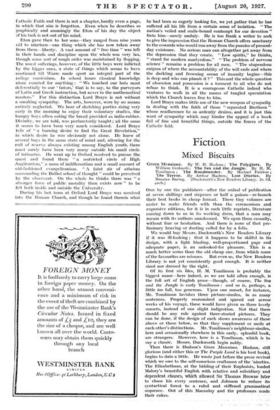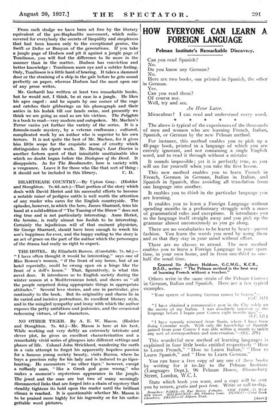Fiction
Mixed Biscuits
-Green Mansions. By W. H. Hudson ; The Polyglots. By William Gerhardi ; The Sea and the Jungle. By H. M. Tomlinson ; The Roadmender. By Michael Fairless ; The Terror. By Arthur Machen; Lost Diaries. By Maurice Baring. (Duckworth's New Readers Library. 3s. 6d. each.) ONE by one the publishers—after the ordeal of publication at seven shillings and sixpence or half a guinea—re-launch their best books in cheap format. These tiny volumes are easier. to make friends with than the ceremonious and expensive editions, for it is in such little reprints, literature coming down to us in its working dress, that a man may
reason with its authors unashamed. We open them casually, without fear or hesitation. And there is none of that pre- liminary heaving or dusting called for by a folio.
We would buy Messrs. Duckworth's New Readers Library if it was ill-looking ; that it happens to be skilful in its design, with a light binding, well-proportioned page and adequate paper, is an unlooked-for pleasure. This is a much better series than the old cheap one, from which some of the favourites are reissues. But even so, the New Readers Library is not yet consistently good enough. It is neither sized nor dressed by the right.
Of its first six files, H. M. Tomlinson is probably the biggest name—here indeed, as we are told often enough, is
the full art of English prose—though, of course, The Sea and the Jungle is early Tomlinson : and so is, perhaps, a little too full, too generous. Upon one sunset, for instance, Mr. Tomlinson lavishes three picture-similes, in as many sentences. Properly economized and spaced out across weeks of his voyage, these would have given us three lovely sunsets, instead of one slight indigestion. Not that there should be any rule against three-storied pictures. They can be done, if the design of each shows awareness of those above or those below, so that they supplement or smile at each other's distinctions. Mr. Tomlinson's neighbour-similes, here and occasionally elsewhere in this early, splendid book, are strangers: However, here is a Tomlinson, which is to say a classic. Messrs. Duckworth begin nobly.
Then there is Hudson's Green Mansions. Hudson, still glorious (and either this or The Purple Land is his best book), begins to date a little. He wrote just before the prose revival which we owe to the self-conscious craftsmen of the 'nineties. The Elizabethans, at the bidding of their Euphuists, loaded Malory's beautiful English with relative and subsidiary and dependent clauses, which allowed Sir Thomas Browne later
to chase his every sentence, and Johnson to reduce its syntactical forest to a ruled and stiffened grammatical sequence. Out of this Macaulay and the professors made their cakes.
From such stodge we have been set free by the literary equivalent of the pre-Raphaelite movement, which redis- covered for everybody the secrets of limpidity and simpleness that had been known only to the exceptional genius, the Swift or Defoe or Bunyan of the generations. If you take a jungle page of Hudson and pit it against a jungle page of Tomlinson, you will find the difference to lie more in the manner than in the matter. Hudson has conviction and better knowledge : Tomlinson more eye and a subtler feeling. Only, Tomlinson is a little hard of hearing. It takes a slammed door or the straining of a ship in the gale before he gets sound perfectly on paper, whereas Hudson had the most open ear of any prose writer.
Mr. Gerhardi has written at least two remarkable books, but he would not, I think, be at ease in a jungle. He likes his apes caged : and he squats by one corner of the cage and catches their gibberings on his phonograph and their antics in his kodak till our heads swim, and presently we think we are going as mad as are his victims. The Polyglots is a book to read—very modern and outspoken. Mr. Machen's Terror varies yet further the variety of the series. It is a formula-made mystery, by a veteran craftsman ; cultured, complicated work by an author who is superior to his own terrors. It is not quite the best of Mr. Machen, for it gives him little scope for the exquisite sense of cruelty which distinguishes his ripest work. Mr. Baring's Lost Diaries is another forlorn quest of that inimitable unattainable idea which no doubt began before the Dialogues of the Dead. It disappoints. As for The Roadmender, here is variety with a vengeance. Leave it for those who like that sort of thing : it should not be included in this library. C. D.



































 Previous page
Previous page